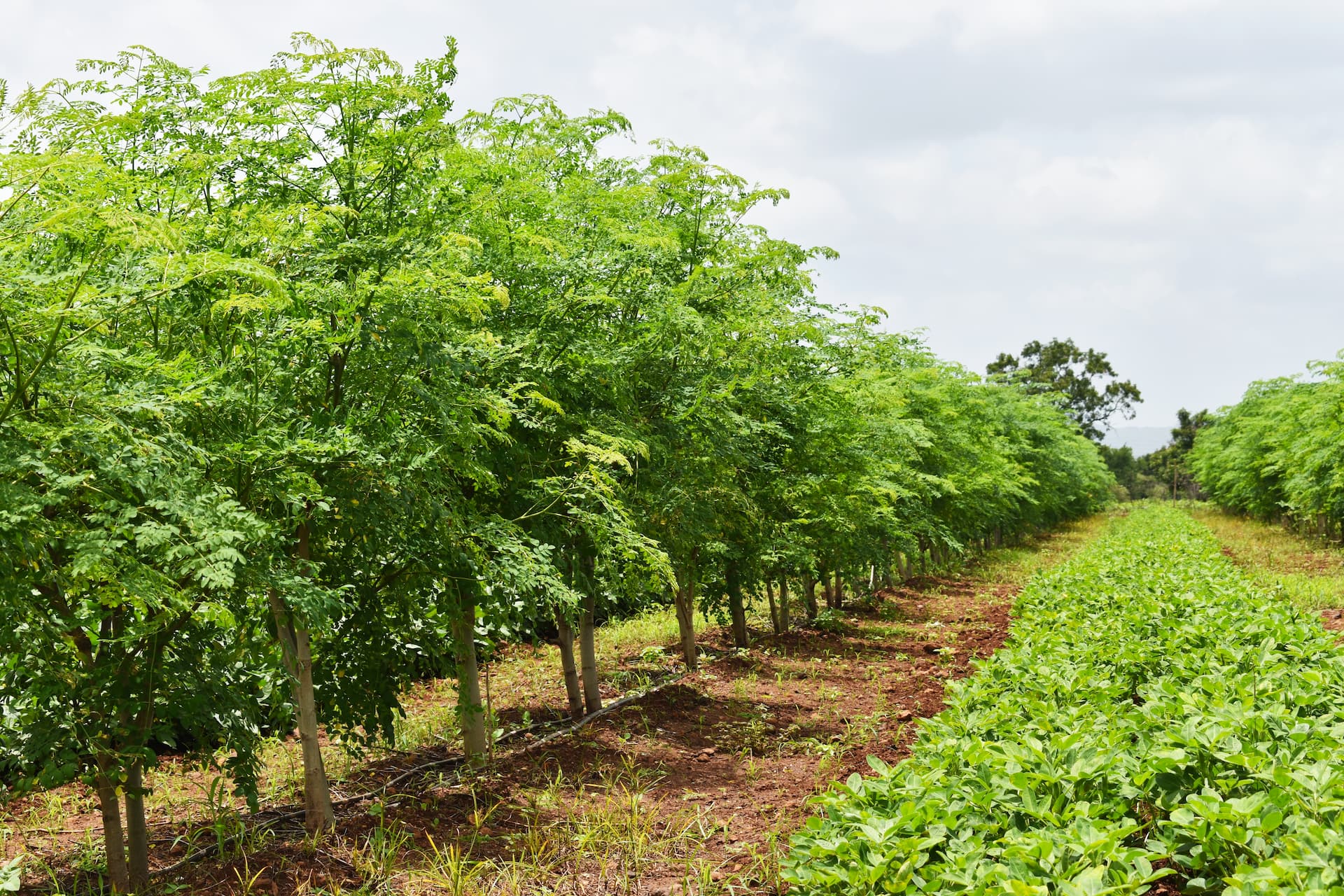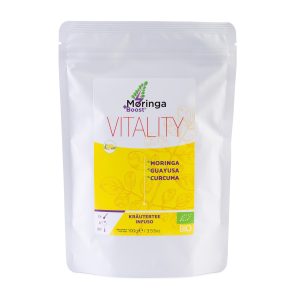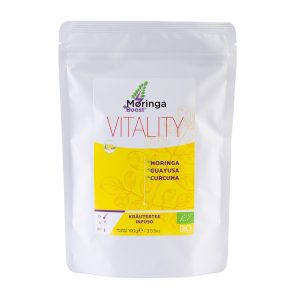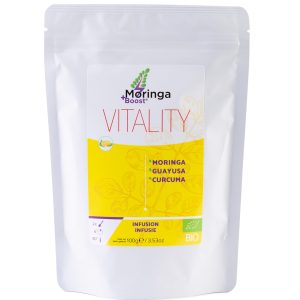The craze for natural products and growing environmental awareness have rekindled interest in responsible crops such as organic moringa. This plant, often dubbed the “miracle tree” for its many benefits, is not only a source of essential nutrients, but also an environmentally-friendly, water-efficient and potentially profitable crop for small-scale farmers. In this article, we explore in detail the key aspects of responsible moringa cultivation.
● Organic Moringa: the plant of a thousand virtues
To understand the worldwide craze for moringa, it’s essential to delve into its wealth of benefits. Moringa leaves, seeds, roots and even flowers are a veritable mine of essential nutrients.
This plant is a veritable nutritional treasure trove, with an exceptional content of vitamins, minerals, proteins and antioxidants. Nutrient-rich moringa leaves are a mainstay of the healthy diet and organic products on the market.
Its benefits include reducing inflammation, boosting the immune system, regulating blood sugar levels and aiding weight loss.
What’s more, this plant is an accessible, affordable source of nutrients, adaptable to many regions of the world.
● Organic farming: free of pesticides and harmful chemicals
Organic moringa cultivation is an essential pillar of responsible moringa cultivation. One of the plant’s most striking features is its natural resistance to pests and disease. This innate resistance eliminates the need to use pesticides and harmful chemicals. The benefits of growing organic moringa are many and far-reaching.
As the leaves are harvested several times a year, it is essential not to use pesticides, as they would not have time to be eliminated. You must therefore be careful about where moringa comes from. At MoringaBoost, we work exclusively with small local growers in Andalusia who are committed to our Quality Charter, and we select the batches for our range ourselves during our frequent field visits several times a year.
Organic moringa cultivation is crucial to sustainable development and environmentally-friendly production.
Protecting consumer health
One of the main reasons why organic moringa cultivation is preferred is the guarantee of pure, healthy products. Moringa products from organic cultivation are free from pesticide residues and harmful chemicals. This means that consumers can take full advantage of the many nutrients in this dietary supplement without exposing themselves to substances potentially harmful to their health.
Environmental protection
Growing organic moringa helps preserve the environment. By eliminating or reducing the use of pesticides, farmers reduce the risk of air, water and soil pollution. This practice promotes a healthier environment, while reducing the negative impact on local ecosystems. Biodiversity thrives in areas where moringa cultivation is favored, helping to preserve local species and protect natural habitats.
Innovative cultivation techniques reduce environmental impact and enhance the value of organic moringa in the green economy.
Improving soil quality
In addition to the benefits for human health and environmental protection, growing organic moringa helps to improve soil quality. Unlike intensive crops, which deplete the soil, this plant enriches the soil with nitrogen, organic matter and essential nutrients. After harvesting the leaves, the dried stems are crushed and used as a natural fertilizer. As a result, farmers can maintain soils that are fertile, sustainable and suitable for long-term agriculture.
● Low water consumption
Another pillar of responsible moringa cultivation is its low water consumption. While many intensive crops require considerable amounts of water, moringa is a drought-resistant tree, thanks to its tuberous root. It can thrive in regions where water resources are limited, offering a valuable solution for farmers facing arid conditions.
● Adapting to climate change
Global awareness of the benefits of organic moringa is stimulating EU-backed initiatives for sustainable agriculture.
Climate change is a major concern for farmers worldwide. Extreme weather events, droughts and floods are becoming increasingly frequent.
Moringa, with its ability to survive in arid conditions, offers a solution adapted to a constantly changing environment. It helps ensure a reliable food source, even in difficult weather conditions. What’s more, planting can help combat greenhouse gas emissions by storing carbon in the soil.
● Profitability for small farmers
Moringa powder, derived from organic farming, represents a sustainable source of income for farmers committed to responsible production. The millions of euros invested in this sector reflect its economic potential and its integration into producers’ specifications. Growing organic moringa can be profitable for small-scale farmers, for a number of reasons.
Income diversification
Growing moringa offers farmers an opportunity to diversify their sources of income. Different parts of the plant, from leaves to seeds, can be transformed into different products, enabling farmers to reach different markets and reduce the risks associated with dependence on a single crop. Moringa leaves are a valuable source of income all year round, while the seeds can be processed into oil rich in essential fatty acids, a product in great demand on the market.
Social benefits
Moringa cultivation can also have a positive impact on local communities. Local farmers can provide jobs in the production, processing and sale of moringa-based products. This strengthens local economies and contributes to economic growth in rural areas. What’s more, moringa contributes to improving local nutrition, which in turn benefits community health.
Expanding markets
Demand for moringa-based products is growing steadily on both local and international markets. Moringa leaves are processed into powders, infusions and dietary supplements. The seeds give rise to precious oils for skin and hair. This growing demand opens up lucrative business opportunities for farmers. Moringa-based products are particularly sought-after by health- and environment-conscious consumers.
● Conclusion
Responsible moringa cultivation offers a promising solution to society’s growing needs in terms of nutrition, health and the environment. Small-scale farmers can adopt organic growing practices, reduce their water footprint and benefit from the growing demand for moringa-based products.
By cultivating this “miracle plant”, farmers are helping to promote sustainable agriculture and provide healthy, nutritious food to a world in search of ecological solutions.
Moringa cultivation is much more than just a crop; it embodies a responsible way of life, focused on health, sustainability and prosperity. Growing moringa means investing in a better future for farmers, consumers and our planet.
Partnerships with local authorities could boost the use of agricultural land for organic moringa cultivation.
As we seek to solve the world’s nutritional, environmental and economic challenges, moringa is emerging as a multifunctional solution that could well be a key to a brighter, healthier future.
Our website provides a showcase for moringa products, underlining our commitment to impeccable quality and ethical production.
References
- Responsible moringa cultivation: Study of the moringa oleifera value chain in five (5) markets in the Niamey Urban Community (CUN)
- Innovative cultivation techniques: Contribution to the study of some Moringa oleifera proteins involved in wastewater purification
- Environmental impact of moringa cultivation : Urban and semi-urban planting of Moringa oleifera Lam. by women’s associations in Burkina Faso: constraints and opportunities





